Pat Bertram's Blog, page 43
November 18, 2021
Settling In, Not Setting Out
A blog I wrote the other day reminded me of one I’d written a long time ago called “The Importance of Being Important,” and I wanted to quote from that old post. I never did find the post; apparently, I had planned to write it, had written the title down on a list of blog topics that eventually got thrown away, and then I forgot all about it. I have no idea what I wanted to say about why we need to be important, but at one time, the idea must have been important to me.
I do think we humans have a need to feel important — to ourselves, if no one else. Importance could be tied in with a need for purpose, for being needed, for feeling that life does mean something, because feeling as if we aren’t important in the scheme of life is a crushing burden.
But that’s not what I want to talk about. In searching for that non-existent post in my archives, I came across essay after essay about my dreams for an epic adventure, plans for such an adventure, preparation for such an adventure, as well as actually setting out on various ventures. It struck me how different my life is now, and how different I am. Instead of setting out to experience more of the world, I am settling in to a world of my own making.
Even if it’s not actually a world I am making, it’s definitely a home — a place of refuge, a place where I belong, and most especially, a place that connects me to the rest of the world. In that respect, it is a way of experiencing more of the world, or at least experiencing the world in a different manner.
After Jeff died, I was afraid of settling down. Since I was well aware of my penchant for being a quasi-hermit (though it’s possible it’s more laziness than an actual penchant because sometimes it takes too much energy to be social), I feared that in settling, I would become a crazy cat lady (sans cats, of course, since I don’t want that much responsibility) and that when my expiration date came, weeks would go by before anyone would know I was gone. Luckily, I have neighbors who keep an eye out for me, and anyway, the role of crazy cat person in this neighborhood is already taken by a man who lives across the street.
[If I ever do write my small-town novel, there are certainly plenty of archetypes to choose from — the aforementioned crazy cat person; the hoarder who won’t let anyone in his house; the neighborhood talker; a generous and civic-minded man and his greedy slumlord brother; the tireless club woman who is active in just about every organization in town; the neighborhood drug dealer and thief. Except for the clubwoman, all the characters are men, which puts a bit of spin on the archetypes.]
Until the Bob issue, I did a good job of finding people to socialize with, but oddly, it’s my place itself that makes me feel as if I am settling in (which to me means taking an active interest in making a comfortable life for myself) rather than settling down (which to me connotes staidness and passively accepting the status quo).
The place seems almost like a presence in my life, as if it wraps itself around me in a comforting way. (I’m laughing here. That sounds almost like the premise of a horror story rather than a pleasant feeling, and perhaps, that’s how crazy old ladies living alone become crazy.)
It’s still early days, of course. I have been here less than three years, and I am just now beginning my journey into elderliness, so who knows how the experience of settling in will turn out. But so far, although I sometimes miss the excitement of setting out, settling in has been good for me.

***

Pat Bertram is the author of Grief: The Inside Story – A Guide to Surviving the Loss of a Loved One. “Grief: The Inside Story is perfect and that is not hyperbole! It is exactly what folk who are grieving need to read.” –Leesa Healy, RN, GDAS GDAT, Emotional/Mental Health Therapist & Educator.
November 17, 2021
Eternal Good Luck
1000 origami cranes is called a senbazuru, which translates as “1000 cranes.” Legend says the crane lives for 1000 years, and from that legend arose the mystique behind the senbazuru. Paper cranes have come to be a symbol of peace. Before that, they meant healing. Before that, a person who folded a 1000 paper cranes was said to have one special dream come true. Originally (at least I think it was originally — the legend has become so entwined with the story of Sadako and Hiroshima that it’s hard to find the original meaning), folding 1000 paper cranes gave a person longevity and happiness — one crane per year for a thousand years — as well as eternal good luck. (Which is why the cranes are often associated with weddings.) Further, the cranes must all be folded within a year.
I had no special wish when I started folding my 1000 cranes at the beginning of this year, though I was taken with the idea of good luck forever.
I’m not sure my 1000 crane project is strictly a senbazuru because from what I can gather, a senbazuru has come to mean 1000 cranes strung together and mine are in plastic bags, 10 cranes per sandwich bag, ten sandwich bags per gallon bag. That was the easiest way for me to keep track of how many I had folded, and now that I am finished and my good fortune stowed so neatly, I see no reason to string them. (Though I did string some other origami birds and hung them in my garage so I know where to stop when I pull into the garage.)
Whatever the name — “senbazuru” or simply “1000 paper cranes” — I just finished folding my origami cranes, well within the required time frame. So now it’s a matter of waiting to see what will happen.
Even if the cranes came with a guarantee of eternal good luck, I don’t expect my life to change all that much. I used to think I was bedeviled by bad luck, but over the years I have come to see that I have more good luck than perhaps I deserve. So often, I don’t get what I want (becoming a better selling author, for example) but more often, I get what I need (a temporary job, for example,) Even better, I sometimes don’t get what I neither want nor need (the Bob, for example. I didn’t want it, didn’t need it, and didn’t get it even though I was definitely exposed to the virus).
The biggest example of more luck than I deserve comes in the form of my house and even perhaps my yard, which, with a little more luck will one day be breathtakingly beautiful as well as safe for an aging woman to navigate.
Whatever the future holds, I know I did my part by folding 1000 origami cranes this year.
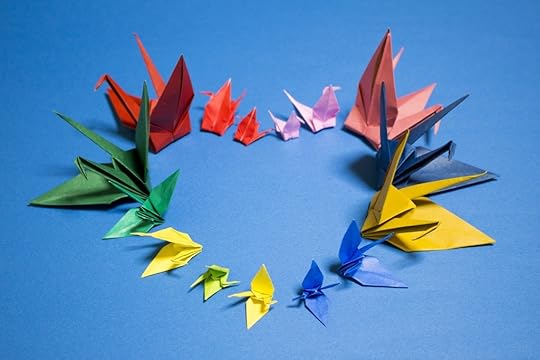
***

What if God decided S/He didn’t like how the world turned out, and turned it over to a development company from the planet Xerxes for re-creation? Would you survive? Could you survive?
A fun book for not-so-fun times.
Click here to buy Bob, The Right Hand of God.
November 16, 2021
Back to Work
My hiatus — my isolation — is over. I go back to work tomorrow, and I’m feeling a bit ambivalent. Not that my job is onerous — it’s not — it’s just that I have become used to an unscheduled life. My ideal has always been to wake in the morning with an empty day stretching ahead of me. The day doesn’t stay empty, of course — there is always something to do, whether undertaking a chore, exercising, writing a blog post, playing on the computer, or reading. (Always, there is reading.) And then there are the unexpected treats, such as a visit from a friend. So it’s not doing nothing that I particularly crave, it’s having a wide open day to do with as I wish.
On the other hand, working gives me focus, company, and . . . yep, money to pay some bills. And in a way, it’s its own special blessing. There will come a time when the job ends, and all I will have are empty days stretching ahead of me. I wonder if those empty days will seem as fraught with possibility when there is nothing to compare them to.
But that isn’t a conundrum I have to face quite yet.
What I do have to face is inclement weather. Tomorrow is supposed to be the coldest day we’ve have so far this fall, with low temperatures barely in the teens. Since I will be going to work, I won’t be able to stay cozied up all day as I’d planned but instead will have to go out and brave the chill. Brrr. I’m shivering just thinking of it. But then, I have warm coats and hats and mufflers in which to bundle up, and anyway, the walk is only two blocks, so I’m sure I will survive the indignity.
Luckily, in this time off, I managed to get caught up on all the little chores that have been niggling at me, such as the last of the planting and a couple of minor paint jobs (a door frame and the handrail on my front ramp), so I can enjoy my day at work without thinking about what else I could be doing.
So, work or not work. — it’s all good.
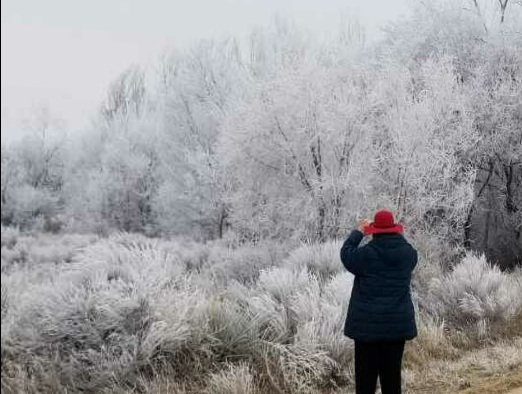
***

Pat Bertram is the author of Grief: The Inside Story – A Guide to Surviving the Loss of a Loved One. “Grief: The Inside Story is perfect and that is not hyperbole! It is exactly what folk who are grieving need to read.” –Leesa Healy, RN, GDAS GDAT, Emotional/Mental Health Therapist & Educator.
November 15, 2021
Servants of the Light Tarot
The Servants of the Light are or were supposed to be one of the leading schools of the occult and magical science. (Isn’t that an oxymoron? Isn’t magic antithetical to science? Or perhaps it’s science that is antithetical to magic? Or perhaps they are the same in which case, wouldn’t the term be redundant?) Anyway, the Servants created their own tarot deck, which is interesting to me because not only are they teaching occult and magical science, they also seem to be making it up as they go along, creating their own suits and names of the court cards.
For example, my two-card tarot spread for today was comprised of the Maker of Crescents and the User of Crescents, traditionally known as the King of Cups and the Knight of Cups. Why the change in nomenclature? I have no idea. They say it’s to create a mini mythology where the Maker (the former king) makes the symbol or artifact of the suit, in this case a crescent, the Giver (the former queen) takes the artifact and gives it to the User (the former knight), who uses the artifact to protect the Keeper (the former page or princess), who keeps the artifact in trust for the future.
It seems a lot of rigamarole that adds nothing to the mystique of the tarot, though perhaps the problem is with me. After all this time, I still have no real conception of what the tarot is all about, but I do know I won’t be using this deck in the future — it seems to confuse the whole issue since although the pictures on the cards seem to reflect the mini mythology, none of the purported meanings of the court cards seem to have anything to do with that mythology.
For example, the first of today’s cards, the Maker of Crescents, stands for a man who is highly regarded in the business world. He is also an entrepreneur who makes the most of every chance.
The second card, the User of Crescents stands for a person who is ready to make sacrifices for what he believes in. Once committed, he will follow through.
So what do these two cards together mean for me? Perhaps that I am ready to make the most of every chance, and once committed I will follow through. Or something like that.
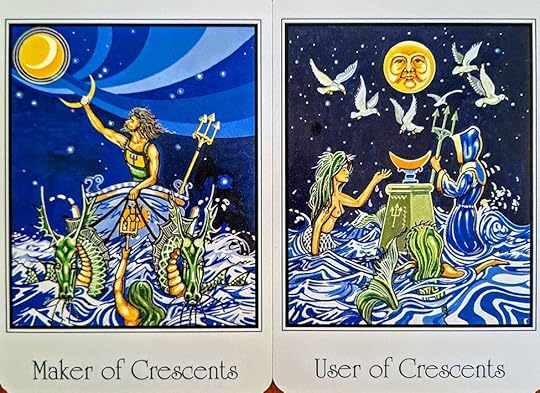
***

What if God decided S/He didn’t like how the world turned out, and turned it over to a development company from the planet Xerxes for re-creation? Would you survive? Could you survive?
A fun book for not-so-fun times.
Click here to buy Bob, The Right Hand of God.
November 14, 2021
“The Loved One Becomes Your Inner Energy”
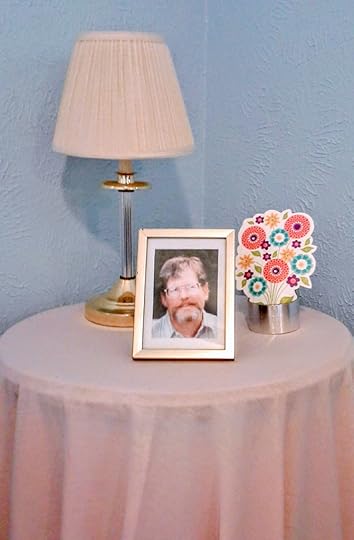
An email correspondent sent me this French quote: “L’être aimé devient votre énergie intérieure” meaning “The loved one becomes your inner energy.” I don’t know if the quote originally was about a deceased loved one or any loved one, but it does seem to fit those of us whose mates have died. At least, it seems to fit me.
Jeff was the first person to accept me as I was, who actually seemed to enjoy my stray and strange thoughts, and who often could do me one better. Until I met him, the best I could hope for from my friends was a bewildered look as they listened to whatever I had to say before they changed the subject to something more mundane. I was stunned on the day I met Jeff when he threw the conversational ball back at me. That truly had never happened before. It was intoxicating, having a back and forth and up and down and all around conversation dealing with things I was thinking about.
Being with Jeff allowed me to be myself in a way I had never been before. The world does not treat its unwitting and naïve noncomformists well, and I was both. I had no idea why people thought I was different, and obviously, I had no idea how to be like them, because whenever I tried, I became even more different.
With Jeff, I wasn’t different. I just . . . was.
Now that the pain of his being gone has dissipated, and now that I am used to living on my own without my special friend — the one with whom I could do everything, the one with whom I could do nothing (finding people to do something with is fairly easy, but finding someone to do nothing with is special indeed) I notice that whatever energy we generated between us that allowed me the freedom of self is still with me.
I don’t in anyway think that he himself is actually with me — I have no idea if he still exists anywhere in any form — but I do feel that energy. It could be why I talk to him (or rather to his picture on my bedside table). Even though I still feel the void where he once was, I also feel that somehow he is still part of my life. This energy could simply be generated by memories of him, though despite the fact that I draw comfort from thinking of him in general, specific memories tend to make me sad because so many of those memories are tinted by his ill health. (For example, if I have a sweet memory of us sitting on the living room floor playing a board game, then it is followed by the memory that the time came too soon when he could no longer concentrate to play.)
When I was new to grief, a woman told me something her widowed mother said, that the loved one’s absence comes to mean what their presence once did. This is sort of the same thing as the French saying. In both cases, I draw strength from having known him, from being with him, from steeping in the courage with which he met his end.
Part of the eventual acceptance of my new life and my new/old self came from a belief — possibly a nonsensical belief — that he wouldn’t have left me if I wasn’t going to be okay. It’s what kept me going for years when I was so bewildered by all that grief threw at me. And it’s given me the inner energy to fuel all the changes in me and my life that have happened since he died.
It truly is odd to think that though he has been gone almost twelve years, he is still so important to me and influential to my life. But then, it’s no odder than any other weirdness encompassed in the experience we call grief.
***

Pat Bertram is the author of Grief: The Inside Story – A Guide to Surviving the Loss of a Loved One. “Grief: The Inside Story is perfect and that is not hyperbole! It is exactly what folk who are grieving need to read.” –Leesa Healy, RN, GDAS GDAT, Emotional/Mental Health Therapist & Educator.
November 13, 2021
Forty Days and Forty Nights
For someone who is supposed to be in isolation, I have a rather active social life, at least I did today. I got one phone call from a friend, made a call to wish another friend happy birthday, got a few emails, and spoke to a few people out in the wilds of my neighborhood. Whew! That’s more socializing than I do when I’m not isolating myself!
It was such a nice afternoon, still and warm, that several people were out and about when I went for a short walk. When I stopped to talk, I made sure I was far away from them, at least twenty feet, so both parties were protected. Tomorrow will be a bit chillier, then the next two days will be warm again. After that, I’ll be out of isolation, but I’m sure it will feel more isolating than these past days because the temperature will drop, and we’ll all be isolating ourselves in the coziness of our homes.
It is interesting, though, that in the computer age, isolation feels a lot less like isolation than it did when quarantines were first created in the 14th century. I paused here to check the internet, and actually, I’m wrong about the isolating factor of quarantines. The practice of quarantine started during plague times. To keep the plague from spreading to Venice and other coastal cities, ships were required to sit at anchor for forty days before landing. So back then, people were quarantined en masse. No isolation for them. They certainly didn’t need computers and such to make them feel less alone.
Quarantine today is a matter of fourteen days, not forty, so I’m not sure the practice can still be called a quarantine since the word comes from the Italian phrase quaranta giorni, which means 40 days. I wonder if they knew that’s how long it would take the plaque to remove itself from the ships, or if it was a biblical thing since Noah endured 40 days and 40 nights of rain, and Jesus fasted in the wilderness for forty days and forty nights. (So why weren’t the ships kept at anchor for quaranta giorni e quaranta notti? Or maybe they were, and like everything else, over time the phrase was shortened to make it less unwieldy.)
Whatever the meaning of quarantine, and despite my rather social time of isolation, I’m glad I don’t have to be alone for forty days and forty nights. Not that the addition of “nights” matters — I’m always alone at night. And anyway, technically I’m self-isolating rather than quarantining since no one is keeping me at home but me, and I can go and do wherever I want as long I stay far away from people. Which tends to be my inclination anyway.

***

What if God decided S/He didn’t like how the world turned out, and turned it over to a development company from the planet Xerxes for re-creation? Would you survive? Could you survive?
A fun book for not-so-fun times.
Click here to buy Bob, The Right Hand of God.
November 12, 2021
Creatures of Words
I’ve long thought that what makes us human — and what separates us from other creatures — is our ability to tell and appreciate stories. From the beginning, as early humans huddled around the fire, they exchanged stories, and the best storytellers were revered.
Stories are our foundation, as necessary to us as love and probably always have been. Stories help us figure out who we are as individuals, and who we are as a people. Stories take us away from our problems, yet they also help us solve them because we can learn how to cope with tragedy, for example, from the stories of those who have dealt with a similar tragedy.
With all our sophistication and technology today, we haven’t come far from our primitive beginnings. Where once we huddled as a group around flickering fires, we now huddle singly before our flickering screens, but the need, the basic human need for stories is the same.
Underlying all this storytelling is language. Without language, there would be no stories. Some people believe that without language, there wouldn’t even be any thought because we need words for thoughts. Making the situation circular, without thought to think up words, there would be no language, either. Did the capability for language evolve at the same time as language itself? Did language create us as we were creating it?
There had to have been a time in our early history where communication was done by gestures and grunts, where any story had to be a simple matter of show rather than show and tell, but it’s hard to imagine such a time.
In trying to perceive a world without words, it becomes understandable that people who have to deal with various forms of dementia where they lose the ability to process words become isolated not just from others but themselves because more important than the stories we tell others are the stories we tell ourselves — about what we are thinking and feeling, what we want, what we hope for, what we regret, what we grieve for.
Memories aren’t just pretty pictures in our minds; since they are often accompanied by words, they too become stories we tell ourselves. In fact, stream of consciousness is all about the story of us that we tell ourselves, and stream of consciousness is words. The reverse is true, too. Without memory, we have no story to tell ourselves.
Words help us define what we are feeling, help us connect to those feelings, and ultimately help us leave those feelings behind. Without words, a feeling is simply that . . . a feeling.
Words must have some sort of survival benefit, otherwise they probably would never have come about, but as I once wrote:
Is language a tool of human evolution, or is it a tool of devolution? Are words a way of dumbing us down while smartening us up? Words seem to keep us focused on the humanness of our world, keep us connected to each other both when we are together and when we are far apart. But are those very words keeping us from a greater connection? Some people believe Earth is a living, breathing creature. Some people think solar systems and galaxies are also alive. Some even believe the universe — all that exists, ever existed, will ever exist — is a living, sentient being. If this is true, are words filling our heads and airways with so much noise that we can no longer feel the breath of Mother Earth, can no longer hear the music of the spheres?
I don’t suppose any of this matters. We are creatures of words. Words create us, and we create them. And even in a world where the spoken word seems to be in danger of being displaced by the various tools at our disposal, those tools themselves — texts, emails, blogs — need words to work.
In other words, words — ever changing though they might be — are here to stay.
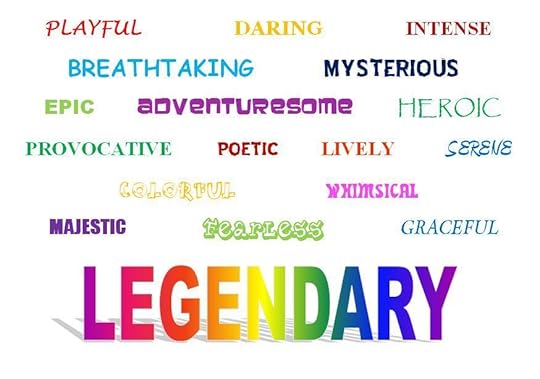
***

Pat Bertram is the author of Grief: The Inside Story – A Guide to Surviving the Loss of a Loved One. “Grief: The Inside Story is perfect and that is not hyperbole! It is exactly what folk who are grieving need to read.” –Leesa Healy, RN, GDAS GDAT, Emotional/Mental Health Therapist & Educator.
November 11, 2021
Dauntless Days

For many years, I faced daunting days, not just Jeff’s ill health, but his death, my grief, caring for my father, becoming more or less homeless. (Not homeless in the living on the street sort of way, but homeless in not having any particular place to live or to be.)
Today was not one of those days. For the second or third or fourth morning (I’ve lost count), I’ve woken up to days that in no way daunt me. Nothing to do but minimal tasks, no appointments, no concerns except to isolate myself and try to keep well. Even the weather does not daunt — chilly enough in the morning to need a coat to water my newly sodded lawn, warm enough in the afternoon to take a refreshing walk.
Because of this lack of dauntingness, I intended to entitle this piece “Dauntless Days,” but according to the various online dictionaries, dauntless is not the opposite of daunting.
Daunting means intimidating and seemingly difficult to deal with.
Dauntless means showing fearlessness and determination.
Undaunting means undiminished in courage or valor; not giving way to fear.
Weirdly, then, on all those daunting days, I had to be dauntless to even get up in the morning and undaunting to get through the waking hours.
So what is the opposite of daunting? Apparently, there is no word with “daunt” as a base to mean what I mean about today not being a daunting day. Some antonyms are: nice, pleasing, calming, comforting. None of those words have the euphoniousness of “dauntless” when paired with “days” that I would have liked for a title.
So, even though this was not a dauntless day (I needed no show of fearlessness or determination to get through the hours), I did speak of the term, so I decided to stick with the title.
And anyway, does anyone but me and a few other logophiles care whether the title is accurate or not? But whatever the title, the meaning of this piece is still the same: today was not at all a daunting day.
***

Pat Bertram is the author of Grief: The Inside Story – A Guide to Surviving the Loss of a Loved One. “Grief: The Inside Story is perfect and that is not hyperbole! It is exactly what folk who are grieving need to read.” –Leesa Healy, RN, GDAS GDAT, Emotional/Mental Health Therapist & Educator.
November 10, 2021
Dark Too Soon
I don’t mind being alone, don’t mind the reason behind the isolation (a huge upsurge of Bob activity in this area), but having to do it in the dark seems a bit much. I’m not really in the dark, since I can turn on lights, but the sun sets at 4:44 pm. It seems as if the day is no sooner getting started than it’s ending.
Even that, I suppose, isn’t such big a deal, but when it gets dark too soon and I haven’t done my daily blog post, then I panic. Where did the day go? What did I do all day? How can I write if I can’t remember?
I’m glad, of course, that my days are so uneventful. I’ve had enough trauma to last me a lifetime, and even though some friends are going through disastrous experiences, I am at one remove from their situations. A lesson I learned from my grief days (days? No. Years!) is to let people have their own sorrows. I empathize, of course, but I can’t take on their sadness — it belongs to them. Come to think of it, I’m even at one remove — or several removes — from my own grief. In four months, it will be twelve years, and that is a long time. (To put it into perspective, that’s the time it takes for nine-year-old children go through puberty then the teenage storms and finally to reach adulthood.)
The only thing of note I did today was turn my Suspense/Thriller Writers Group on Facebook from public to private. FB is changing the way they do groups, so now if you have a public group, anyone can join immediately without being vetted. Considering how many spammers find the group (not just robots but also authors who only want to promote their books), it would turn a rather innocuous and inert group into a nightmare. Besides, since my blog URL is still blocked, I have little interest in spending any time on FB. For now, I reblog this blog to another blog and post that URL on FB, but when they discover my ruse, and block the reblog, then I’m finished with them.
Although it’s not particularly noteworthy, since it’s something I do every day, I did go out and water my lawn. It still astonishes me that I did that — add a bit of lawn. I wanted just a small corner of grass in my yard (else what’s the point of having a lawnmower), but since I didn’t know how big of an area a pallet of sod would cover, I agreed to buy the two pallets a local landscaping company had left over from another job. I worried that it wouldn’t be enough to cover the 400-square-foot corner; instead it covered 1,000 square feet, if not more, especially since they had a partial pallet left over they threw in at no cost.
I suppose 1,000 square feet isn’t all that much lawn, though it seems huge when it needs to be watered.
Oh, and I did manage to blow most of the leaves off my rock, but a big wind will simply blow them back. So here’s hoping the winds remain fairly calm until the leaves settle in.
I hope you’re doing better with the early dark than I am. And to think it will continue getting darker for the next six weeks! Hmmm. Perhaps I shouldn’t think about that.
[image error]Pexels.com" data-medium-file="https://ptbertram.files.wordpress.com..." data-large-file="https://ptbertram.files.wordpress.com..." src="https://ptbertram.files.wordpress.com..." alt="" class="wp-image-18630" width="600" srcset="https://ptbertram.files.wordpress.com... 1024w, https://ptbertram.files.wordpress.com... 150w, https://ptbertram.files.wordpress.com... 300w, https://ptbertram.files.wordpress.com... 768w, https://ptbertram.files.wordpress.com... 1880w" sizes="(max-width: 1024px) 100vw, 1024px" />***

What if God decided S/He didn’t like how the world turned out, and turned it over to a development company from the planet Xerxes for re-creation? Would you survive? Could you survive?
A fun book for not-so-fun times.
Click here to buy Bob, The Right Hand of God.
November 9, 2021
Righteous Exhaustion

With all the work I’ve been doing to landscape my yard, as well as tracking in dirt into the house via my shoes (even though I leave them at the door, the dirt seems to spread throughout the house), I’d pretty much given up housework as a lost cause. Well, today, that cause ceased to be lost and instead became found. And ai yai yai, what a task!
I hadn’t actually planned to clean the house, but I have been in the habit of doing something physical in the mornings. It was too cold to go outside and sitting down to read so early in the day smacked of wanton idleness, so I decided to get rid of the worst of the dust. Well, one thing led to another, and two hours later, I was still working.
This is a small house, and I have various modern cleaning tools at my disposal, so it shouldn’t have taken me very long, but the place needed a thorough cleaning. Apparently, I stopped seeing the dust on the flat surfaces and building up in the corners. Or more to the point, I didn’t want to see because there was nothing I could do (or wanted to do) about it since I was exhausted from my outside activities.
And now I’m exhausted from inside activities.
To be honest, I think all the digging and planting I’ve been doing were easier than cleaning house. Admittedly, everything is brighter now without dust dulling floors and furniture, but still, it was hard work. Now that most of the outside chores are done — only watering my newly sodded lawn and eventually sowing wildflower seeds remain — I should be able to go back to playing house more frequently rather than working at it as I did today.
Wait . . . I just thought of another outside chore I will have to begin doing as soon as the leaves on the neighbors’ trees are gone — blowing leaves off the ornamental rock around my house and garage. I’m not real anxious to attack that job because I have a feeling not all the leaves will blow off since they didn’t on a trial run, but all I can do is the best I (and my tools) can do. The leaf blower blows hard, so that’s not the problem. In fact, on the high setting, it’s enough to blow the rocks around, but some twigs and leaves still remain.
But that’s not a problem for today. Today I just want to bask in righteous exhaustion and the thought of a job well done.
***

Pat Bertram is the author of Grief: The Inside Story – A Guide to Surviving the Loss of a Loved One. “Grief: The Inside Story is perfect and that is not hyperbole! It is exactly what folk who are grieving need to read.” –Leesa Healy, RN, GDAS GDAT, Emotional/Mental Health Therapist & Educator.



